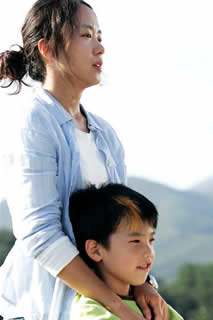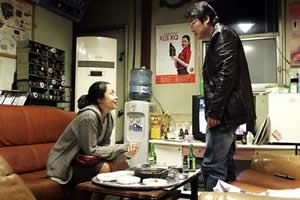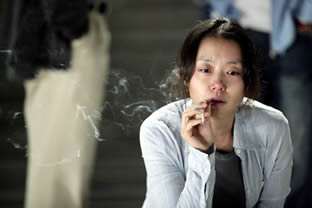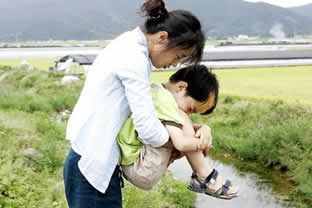Lee Chang Dong, director of Secret Sunshine, graduated in 1980 with a degree in Korean Literature from Kyungpook National University in Daegu, where he spent much of his time in the theater, writing and directing plays. After a spell teaching Korean Language in high school, he established himself as a renowned novelist with his first novel Chonri in 1983. Later in his career, to the surprise of many, he turned to movie making.
Lee did not study filmmaking before starting out. He penned two screenplays, Park Kwang-su’s To the Starry Island in 1993 and A Single Spark in 1995. After being encouraged by his contemporaries to finally step behind the director’s chair, Lee made Green Fish, a “critique of Korean society told through the eyes of a young man who becomes enmeshed in the criminal underworld” in 1997.
In 2000, Lee made Peppermint Candy, a story following a single man in reverse chronology through 20 years of South Korean history
He served as the minister of Culture and Tourism in the South Korean Government from 2003 to 2004. (from Wikipedia http://en.wikipedia.org/wiki/Lee_Chang-dong)
Lee’s fourth film, Secret Sunshine centers around a lady that copes with the death of her husband and child. The Korean title, Milyang, is given after the city that served as the film’s setting and filming location. Secret Sunshine is a literal translation of Miylang.
Secret Sunshine is Official Korean submission for Best Foreign Language Academy Award
Screening: Tuesday, Jan 8th 5:30pm/Regal 6 Theater. Tickets available at www.psfilmfest.org Cinema Without Borders: What motivated you to make “Secret Sunshine”? Were you inspired by a real character or a real event?
Cinema Without Borders: What motivated you to make “Secret Sunshine”? Were you inspired by a real character or a real event?
Lee Chang-Dong: Secret Sunshine is based on a short story by Chung Joon Lee called The Story of a Worm. I only borrowed the main plot of that story and I created the rest.
CWB: If Secret Sunshine plot was used in a Hollywood movie it would have been ended by saving the kidnapped kid or a revenge story, but you take your audience to a painful trip, facing them with realities. How did you come up with the structure of the Secret Sunshine?
Lee: By nature I don’t like movies where audiences enjoy the show and forget about it the moment they leave the theater. I don’t want the audience to be finished with the film in the theater. After they leave the theater, I want the audience to relate their experience to their relationships in their everyday lives. Even if a movie has a happy ending, it does not necessarily give a happy ending to the audience’s own lives. Traditionally, Hollywood structures are very complete. If a film is complete it does not correspond to the reality of our actual lives. I want the audience to connect to the film as if it is real life. That’s why I like to leave the endings open, because I want the audience to complete them.
leave the endings open, because I want the audience to complete them.
CWB: Was your screenplay completely ready before you start the film or you were open to improvisation?
Lee: I begin with a completed scri pt and during the shooting I do not use storyboards. Instead I leave it kind of open when it comes to shooting. Sometimes we change a few words, but very rarely. Some people, especially many Koreans, believe that Secret Sunshine has many ad-libs because the dialogue is realistic. In fact, I stick very close to the written word.
CWB: Does your work as a theatre director and novelist influence you as a filmmaker?
 Many stage directors and novelist find it hard to switch to filmmaking, how was this change for you?
Many stage directors and novelist find it hard to switch to filmmaking, how was this change for you?
Lee: I would say hundreds of writers and movie directors have influenced me. And sometimes a certain element, let’s say in a cheap movie, can stimulate me. If you want me to be specific I would have to say, John Cassavetes, Ingmar Bergman, Robert Bresson and Hou Hsiao-Hsien. Well, I could add a lot more directors but there are too many.
I never intended to be a movie director nor did I study film. That could be one of the reasons I became a filmmaker. One who badly wants it does not get it but the one who does not want it gets it. It is one of the ironies of life.
CWB: Please tell us about your experience in working with Jeon Do-yeon? Has her award for “Best Actress” in Cannes helped the successes of “Secret Sunshine”? Her performance is so real and honest that it is hard to believe she is not playing herself.
Sunshine”? Her performance is so real and honest that it is hard to believe she is not playing herself.
Lee: I always tell her to experience the emotional reality of the character as opposed to expressing it. I understand it was difficult for her to experience the emotion of the character she was playing.
I would say, our Best Actress Award probably helped the box office. In general, audiences are more interested in Best Actor/Actress rather than Best Director.
CWB: How did you come up with the visual style of Secret Sunshine?
Lee: I want the film to contain as is what we see with the naked eye. I wanted the audience to feel it is not filmed, but that they are watching a slice of real life. I try to eliminate all cinematic visual elements. In terms of handling the camera, I did not want to make it too subjective by making the audience completely empathize with the characters or too objective by keeping a great distance. My position is located in the middle. I like to let the audience observe, but with a sense of  sympathy and understanding.
sympathy and understanding.
CWB: What was the most challenging aspect of making Secret Sunshine?
Lee: Everything is challenging for me. Probably the most difficult thing is the impact this film has on the audience. This movie could easily make the audience too uncomfortable. I wanted to communicate with the audience but I chose a channel which could be uncomfortable. Movies that deal with the realities of life make audiences uncomfortable who come to the theatre to escape their reality.
CWB: How audiences have received “Secret Sunshine” in its screening inside and outside Korea?
Lee: Actually, to my surprise 1.7 million saw the movie in Korea. I would say it was a big success considering the content of the movie. Outside of Korea, the movie is very well received as well.

